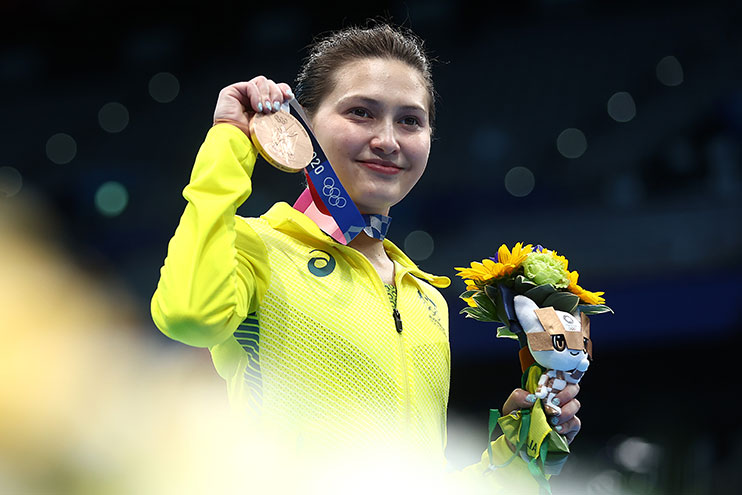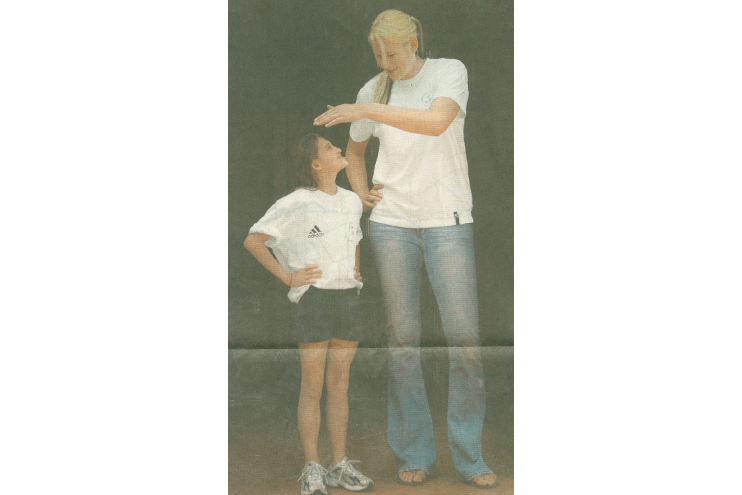
After debuting at the Melbourne 2006 Commonwealth Games as a 13-year-old, the Diving Australia legend added to her legacy by winning her second career Olympic medal at the Tokyo Games.
The Tokyo Olympics have proved to be a tale of perseverance for four-time Olympian Melissa Wu who broke through to win her first individual Olympic medal.
The four time-Commonwealth Games medallist secured her second career Olympic medal after claiming bronze in the women’s 10-metre platform final.
It has been quite a story for the 29-year-old Sydneysider who has been in the Diving Australia program for more than half of her life.
Wu was still in primary school when she burst onto the scene at the Melbourne 2006 Commonwealth Games as a 13-year-old who weighed just 28 kilograms and at 135 centimetres stood barely waist-high to teammates such as the basketballer Lauren Jackson.

Melissa Wu meeting with Lauren Jackson at the Melbourne 2006 Commonwealth Games. (CGA Archive)
Despite her diminutive size, it didn’t stop Australia from seeing she had the heart and determination of a giant.
Wu would win first of her four Commonwealth Games medals at the Melbourne Games, partnering with Alex Croak to finish with silver in the women’s synchronised 10-metre platform.
Two years later, at the Beijing 2008 Olympics, Wu along with Briony Cole would win silver in the synchronised 10-metre platform, becoming the youngest Australian ever to win an Olympic medal in diving.
At the Delhi 2010 Commonwealth Games, Wu would go one better in the event, winning the gold medal and adding silver in the individual 10-metre platform event, her fourth multi-sport medal for Australia in just as many years.
By the age of 16, she had medalled in every major international diving competition.
Yet after making a splash in the diving world so early in her career, it was a twist that Wu would then have an 8-year wait between major 10m platform medals.
Wu narrowly missed the medals with a fourth-place finish at the London 2012 Olympics.
After missing much of the 2013 season due to a back injury, Wu returned at the Glasgow 2014 Commonwealth Games to record a fifth-place finish in the 10m synchronised platform event but an uncharacteristic eleventh in the individual event, then a fifth-place finish at Rio 2016 in the women’s 10-metre platform.
With injury preventing her from competing at the 2018 Australian trials, Wu’s Gold Coast Commonwealth Games campaign was almost derailed on the eve of the Games, when her synchronised partner Taneka Kovchenko had to retire due to injury.
With just days to prepare, Wu competed with Teju Williamson in the synchronised 10m platform – their first competition together – and finished fourth.
Showcasing her legend and despite the interrupted lead-in, Wu achieved a career personal best result by winning gold in the 10-metre platform at the Gold Coast 2018 Commonwealth Games – a performance that kickstarted her quest for a medal in Tokyo.
A quest that almost was again derailed due to shoulder and rib injuries, with Wu admitting that she may not have qualified for the Games if they went ahead in 2020 as scheduled, but with the postponement of the Olympics, the Australian diving legend was able to get her body right ahead of the Games.
Wu came out firing in the final and looked a good chance for a medal from the outset.
The Sydneysider was fourth after her first dive before moving into third with her next dive where she stayed for the remainder of the competition.
Her final attempt secured her best score of the final — an 81.60 — which delivered her the bronze she is so deserving of, finishing behind Chinese pair Hongchan Quan and Yuxi Chen.
View this post on Instagram
Stepping away from the water, the Kookaburras fell agonisingly short of a gold medal after losing out to Belgium in the men’s hockey final.
It wasn’t the result that the Gold Coast 2018 gold medallists were after, but the men’s national side should be incredibly proud after playing a wonderful tournament.
One of the stars of the tournament was Tom Wickham who scored six goals in all matches, including the equaliser for the Kookaburras in the gold medal match.
Wickham is one of the great stories to come out of Tokyo after the Gold Coast gold medallist wasn’t initially selected in the squad.
A change in the International Olympic Committee rules on team selections saw him added to the squad at the eleventh hour, Wickham’s goal in the second half to put Australia back in the match was one to remember.
Despite Wickham’s brilliance, the Kookaburras were left heartbroken after losing to the world no. 2 ranked Belgians in a drama-filled penalty shootout.
It appeared Australia had lost after missing their fifth and final penalty.
However, they received a reprieve from the video official who saw an infringement on Jake Whetton from the Belgian goalkeeper.
Whetton afforded a re-take but unfortunately, the Belgian ‘keeper was up to the task and kept the Australian out – resulting in a devastating loss for the Kookaburras.
An emotional Kookaburras captain Aran Zalewski spoke about the agony that the team was feeling following the loss.
“I’m not sad but it was a real shame that we didn’t have any fans and family and friends here,” Zalewski told Channel 7 after the match.
“I know they’ll be super proud of us and it was a great tournament, but there’s just that burning desire in my heart that I know we might have left something out there today. If we didn’t, we didn’t fulfil our potential.
“I know all the boys will be hurting in the change room as well.
“I just put my heart out to them, my family and friends, and everyone back in Australia and all over the world.”
View this post on Instagram
It was an eventful few nights at the Izu Velodrome with drama on the wooden boards.
The track has claimed more than a few riders during competition with multiple riders coming off their bikes.
The most spectacular and stunning of all the crashes was reserved for Gold Coast 2018 Commonwealth Games gold medallist Alex Porter.
Competing in the qualifying of the men’s team pursuit where the Australian foursome came into the Games as a gold medal chance, saw the chances evaporate as Porter’s handlebars snapped off his bicycle mid-race.
Porter was competing with his Gold Coast gold medal-winning teammates Kelland O’Brien, Sam Welsford and Leigh Howard in qualifying for the team pursuit when the incident occurred.
The 25-year-old was thrown forward onto the track, as his teammates signalled to officials to stop their run.
Porter came off the bike at approximately 65 km/h and received cuts and abrasions to his face but was not seriously injured.
He and his teammates were allowed a second run, but after expending energy in the first run and not at full stamina for the 16-lap race, the team went on to set the fifth-ranked time of 3 minutes 48.448 seconds missing out on the gold medal race, but still in contention for a bronze medal.
AusCycling has since launched an investigation into the bike malfunction that saw Porter thrown from his bike.
A night later, the Aussies suited up again in pursuit of a bronze medal against the New Zealanders.
As the two nations battled back and forth during the first two kilometres of the race, remarkably, with the race in the balance, Kiwi rider Aaron Gate crashed unexpectedly.
The Australian squad soon caught up to pass the Kiwis ending the pursuit and claiming a hard-fought bronze medal for the Australian team.
Congratulations to the @AusCyclingAus stars for winning bronze in the men’s team pursuit for the @AUSOlympicTeam! 🚴♂️🥉🇦🇺💚💛
Well done lads! 👏👏👏 Four of the five team members were on the @GC2018 gold medal-winning team!#tokyotogether #cycling #Tokyo2020 #greatertogether https://t.co/u3nL71NDdm pic.twitter.com/NGAUDNQxGZ
— Commonwealth Games Australia (@CommGamesAUS) August 4, 2021
Finally, it was a day to remember for Australian Ashley Moloney who took out the bronze medal in the men’s decathlon.
Moloney wrote his name in the history books as he finished on 8,649 points, an Australian record, and became the first athlete in Australian history to win a decathlon medal at an Olympic Games.
The feat will go down as one of the more memorable ones in Australian Olympic history due to the encouragement from fellow Aussie decathlete Cedric Dubler.
The Gold Coast 2018 decathlon bronze medallist was out of contention for a medal come the 1500-metre race, the last of the 10 events over the two days of decathlon competition.
Dubler was pacing and encouraging his teammate for the duration of the final event, trying to will him over the line for a bronze medal.
“He [Dubler] was screaming, I can’t repeat what he said,” Moloney told Channel 7 after the race.
“I could hear his voice bouncing in my cranium like a bat out of hell.
“I started to hit a bit of a wall at 800 metres and I just said ‘stick to Cedric, don’t let him get too far away’ and I executed.”
Moloney was only 62 points ahead of fourth-placed American Garrett Scantling heading into the final event and it looked like the Aussie might get chased down.
However, the encouragement from Dubler inspired Moloney who finished just under four seconds behind Scantling to hold onto third place.
Moloney’s efforts earned the first athletics medal for his country at the Tokyo 2020 Games.
Cedric Dubler finished in 21st place with 7,008 points.
“I could hear his voice bouncing in my cranium like a bat out of hell.
“I started to hit a bit of a wall at 800 metres and I just said ‘stick to Cedric, don’t let him get too far away’ and I executed.”
Moloney was only 62 points ahead of fourth-placed American Garrett Scantling heading into the final event and it looked like the Aussie might get chased down.
However, the encouragement from Dubler inspired Moloney who finished just under four seconds behind Sccantling to hold onto third place.
Moloney’s efforts earned the first athletics medal for his country at the Tokyo 2020 Games.
Cedric Dubler finished in 21st place with 7,008 points.
Congratulations to @AthsAust star Ash Moloney on winning bronze in the men’s decathlon for the @AUSOlympicTeam! 🙌🥉🇦🇺💚💛
An outstanding two days of competition from the 21-year-old! #TokyoTogether #Athletics #GreaterTogether https://t.co/Ka9SagIYjj pic.twitter.com/nzBWUPNhRm
— Commonwealth Games Australia (@CommGamesAUS) August 5, 2021
